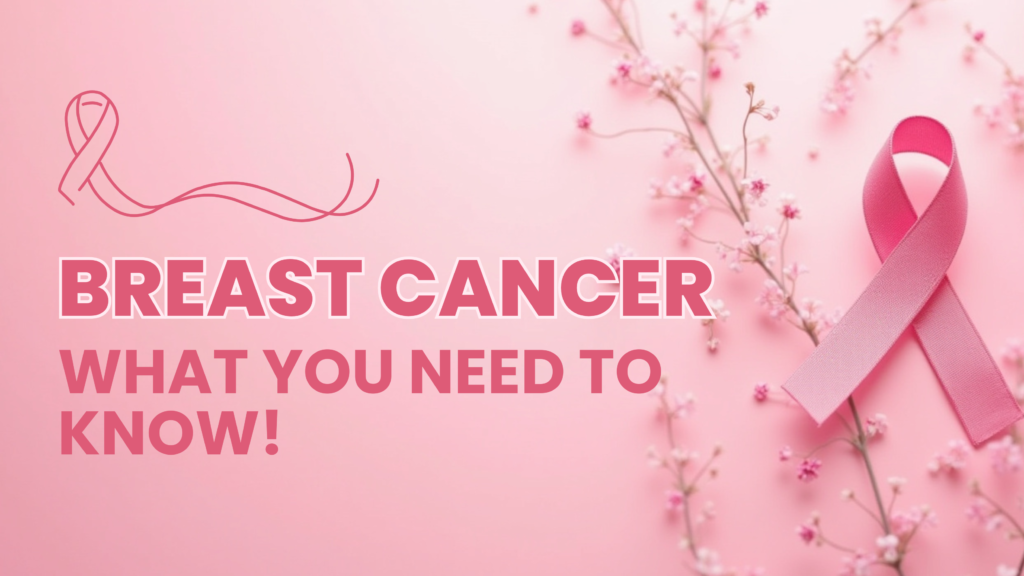Breast cancer is one of the most common cancers affecting women globally. While awareness and early detection have improved survival rates, understanding the risk factors can help individuals take preventive measures. This blog dives deep into the top risk factors that increase the chances of breast cancer, especially focusing on the growing concerns in India’s Tier 2 and Tier 3 cities.
What is a Risk Factor?
A risk factor is anything that increases a person’s likelihood of developing a disease. Having one or more risk factors doesn’t necessarily mean you’ll get breast cancer, but it raises the chances compared to someone without them.
Top Risk Factors for Breast Cancer
- Age
The risk of breast cancer increases as women age. Most breast cancer cases are diagnosed after the age of 50. However, in India, many cases are now being reported in younger women, often due to lifestyle changes and genetic predispositions.
- Family History and Genetics
Women with a family history of breast cancer (especially in a mother, sister, or daughter) have a higher risk. Certain genetic mutations, particularly BRCA1 and BRCA2, significantly raise the chances.
- BRCA1 mutation increases risk up to 65%
- BRCA2 mutation increases risk up to 45%
These gene mutations can be passed down from either parent.
- Hormonal Factors
Exposure to estrogen over a longer period increases breast cancer risk. This includes:
- Early menstruation (before age 12)
- Late menopause (after age 55)
- Hormone Replacement Therapy (HRT) during menopause
- Oral contraceptives with high estrogen content
- Personal History of Breast Conditions
Women who have had non-cancerous breast diseases like atypical hyperplasia or lobular carcinoma in situ are at a higher risk of developing breast cancer later.
- Obesity and Overweight
Being overweight, especially after menopause, increases breast cancer risk. Fat tissue produces estrogen, and higher levels of estrogen have been linked to the growth of hormone-sensitive breast cancers.
- Alcohol Consumption
Regular and excessive alcohol consumption increases the risk of breast cancer. Even one alcoholic drink a day can slightly raise the risk, and the risk rises with the amount consumed.
- Lack of Physical Activity
A sedentary lifestyle contributes to obesity and hormonal imbalance, both of which are significant risk factors for breast cancer. Regular exercise helps lower breast cancer risk by controlling weight and hormone levels.
- Radiation Exposure
Women who received radiation therapy to the chest area (especially for diseases like lymphoma) during childhood or early adulthood have a higher lifetime risk of breast cancer.
- Late Pregnancy or No Pregnancy
Women who have their first child after the age of 30 or never have children are at an increased risk compared to women who have children at a younger age.
- Diet and Poor Nutrition
High-fat, processed food and low-fiber diets contribute to obesity and hormonal imbalance, indirectly increasing the risk. A balanced, plant-based diet rich in fruits, vegetables, and whole grains can help lower the risk.
Factors Specific to India’s Tier 2 & Tier 3 Cities
In India’s developing cities, breast cancer awareness and screening practices are still limited. These factors are especially relevant:
- Lack of awareness about self-examinations and regular screenings.
- Late diagnosis due to limited access to healthcare facilities.
- Cultural taboos preventing women from discussing breast health.
- Increasing westernized lifestyles with higher alcohol intake, smoking, and sedentary habits.
Creating awareness campaigns and promoting early detection in these cities is crucial.
Can These Risk Factors Be Controlled?
While some risk factors like age and genetics are uncontrollable, many lifestyle-related risks can be reduced:
- Maintain a healthy weight.
- Exercise for at least 30 minutes daily.
- Limit alcohol and tobacco consumption.
- Get regular mammograms or clinical breast exams.
- Be aware of your family history and consider genetic testing if necessary.
- Eat a nutrient-rich, balanced diet.
Final Thoughts
Understanding the top risk factors for breast cancer empowers individuals and communities to take preventive steps and seek timely medical advice. It’s crucial for women, especially in India’s Tier 2 and Tier 3 cities, to be informed about these risks and overcome the social barriers surrounding breast health.
Early detection saves lives. Let’s spread awareness and fight breast cancer together.



